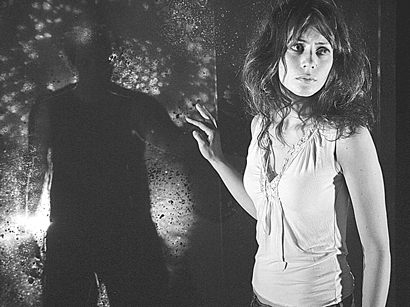Volume 5, Number 18 | May 4 – 10, 2006
THEATER
One Man’s War
Triad Theater
158 W. 72nd St.
Sat. 3 p.m.
Open run
$35; $25 veterans, $20 students; 212-352-3101
Bloody Mary
CVS Cultural Center
107 Suffolk St.
Wed.-Sun. 8 p.m.
Through May 13
$18; 212-868-4444
Zarathustra Said Some Things, No?
Shelter, Theater 54, 12th floor
244 W. 54th St.
Tue.-Sun. 8 p.m., Sat., Sun. 2 p.m.
Through May 21
$30; 212-352 3101
Off-off B’way’s Talent Glut
Performers shine no matter what the script says
There’s no shortage of great talent in the acting off-off-Broadway these days, something which unfortunately can’t be said of the plays in which the actors are performing. Case in point is “One Man’s War,” written and directed by Sammy Dallas Bayes, which has returned to the New York stage for the second time. Michael Marinaccio plays Doug Hulbert, a gang member who is given a choice by a judge to either go to jail or enter the Marine Corps. Doug chooses the Corps and we follow his experiences in boot camp, in Viet Nam and afterward. Marinaccio endows Doug with great strength of character and we identify with him even though he is a hood. The performance is bold and riveting as we enter this young man’s thoughts about war—from his initial enthusiasm through the experience of scorn upon his return home.
The play isn’t particularly anti-war or even very political, but the trouble is we have seen it all before in war movies—the macho posturing before hand, the vicious boot camp, the horrors of actual combat, the disillusionment with war and the rejection at home. The play covers ground we have been on before quite often. It’s one man’s war alright—purportedly based on the experience of a friend of the playwright’s—but it’s also the war we have all seen, not only in Viet Nam movies like “Full Metal Jacket,” “The Deer Hunter,” “Coming Home,” and “Born on the 4th of July” but in classics like “Grand Illusion,” and “Paths of Glory.” It is an oddly circumspect play. It tells Doug’s story very quietly and then dribbles to an end with his return to Viet Nam for a second tour of duty.
Having said, that writer-director Bayes makes up for the shopworn playwriting with superb direction. The action is fast and furious on the stage with strobe effects standing in for machinegun fire perfectly. He also blocks a large ensemble of actors with great assurance. But the real reason to go is Michaal Marinaccio’s performance.
Audrey Lynn Weston is a lovely presence in Rachel Shukert’s “Bloody Mary,” the tale of the rise of Queen Mary Tudor in 16th century England. The play is meant to be an epic comic travesty of the period and travesty is the operative word. It’s a bawdy spectacle of fornication, debauchery, and murder and features some 30 speaking roles. Mary was the daughter of Henry VIII and Catherine of Aragon and succeeded to the throne when none of Henry’s eight wives could bear him a son.
Weston is the best reason to see the play. She’s the still center of a whirligig and she measures her lines very carefully, imbuing the overripe dialogue with quiet authority. Unfortunately, the play is overblown with actors careening about on stage, acting out, and delivering unfunny lines mostly about sex. Anne Boleyn makes an appearance in drag but so does Jimi Hendrix as a consort of the Queen, so you know what you’re in for—an evening in which not a lot of what goes on onstage makes a lot of sense. Ian Unterman plays Henry VIII to the hilt but we don’t get much insight into this very familiar character. The anachronistic play is on speed most of the time, but that doesn’t make its two-hour running time pass by quickly. Despite all the heavy breathing and a certain desperate quality it isn’t fun to watch.
On the super serious side is Trevor Ferguson’s “Zarathustra Said Some Things, No?” a two-character play in which a junkie couple—half brother and half sister—play a series games with each other and contemplate the abyss. The actors, Lynn Roessler and particularly, Brett Watson, do a lot to mitigate the pretentiousness of this vehicle, which is well directed by Robin A. Paterson.
Holed up in a messy Paris atelier, Adrienne and Ricky, a Canadian couple, fight, test each other’s nerves and wait for the perfect day to commit suicide together by jumping off the high balcony at sunset. The day never arrives and so we spend the time watching them exercise their self-loathing. They tell each other stories, issue threats, play elaborate mind games, stage group therapy sessions, play cruel jokes on one another, and try to face the truth of their blasted lives.
Their game playing becomes a little tiresome but the actors redeem the material with sterling playing. Watson plays the suffering lump Ricky and he evokes real compassion. We empathize with his condition and his conviction that suicide is the only alternative. Roessler has the more strident role. It’s difficult to like her when she is tormenting Ricky but it’s to the actor’s credit that we come to sympathize with her despair. What things did Zarathustra say? Well for one thing he proclaimed the death of God. The play never really gets around to telling us much more than that, though the subject keeps coming up.
gaycitynews.com



































